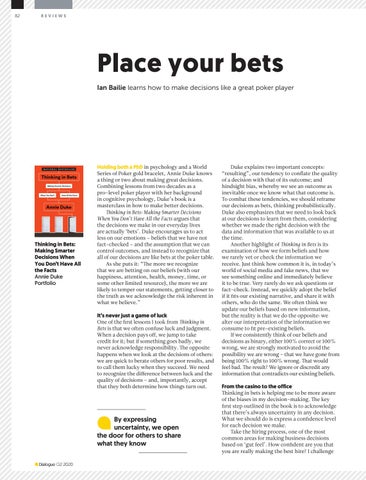82
REVIEWS
Place your bets Ian Bailie learns how to make decisions like a great poker player
Thinking in Bets: Making Smarter Decisions When You Don’t Have All the Facts Annie Duke Portfolio
Holding both a PhD in psychology and a World Series of Poker gold bracelet, Annie Duke knows a thing or two about making great decisions. Combining lessons from two decades as a pro-level poker player with her background in cognitive psychology, Duke’s book is a masterclass in how to make better decisions. Thinking in Bets: Making Smarter Decisions When You Don’t Have All the Facts argues that the decisions we make in our everyday lives are actually ‘bets’. Duke encourages us to act less on our emotions – beliefs that we have not fact-checked – and the assumption that we can control outcomes, and instead to recognize that all of our decisions are like bets at the poker table. As she puts it: “The more we recognize that we are betting on our beliefs (with our happiness, attention, health, money, time, or some other limited resource), the more we are likely to temper our statements, getting closer to the truth as we acknowledge the risk inherent in what we believe.”
It’s never just a game of luck
One of the first lessons I took from Thinking in Bets is that we often confuse luck and judgment. When a decision pays off, we jump to take credit for it; but if something goes badly, we never acknowledge responsibility. The opposite happens when we look at the decisions of others: we are quick to berate others for poor results, and to call them lucky when they succeed. We need to recognize the difference between luck and the quality of decisions – and, importantly, accept that they both determine how things turn out.
By expressing uncertainty, we open the door for others to share what they know Dialogue Q2 2020
Duke explains two important concepts: “resulting”, our tendency to conflate the quality of a decision with that of its outcome; and hindsight bias, whereby we see an outcome as inevitable once we know what that outcome is. To combat these tendencies, we should reframe our decisions as bets, thinking probabilistically. Duke also emphasizes that we need to look back at our decisions to learn from them, considering whether we made the right decision with the data and information that was available to us at the time. Another highlight of Thinking in Bets is its examination of how we form beliefs and how we rarely vet or check the information we receive. Just think how common it is, in today’s world of social media and fake news, that we see something online and immediately believe it to be true. Very rarely do we ask questions or fact-check. Instead, we quickly adopt the belief if it fits our existing narrative, and share it with others, who do the same. We often think we update our beliefs based on new information, but the reality is that we do the opposite: we alter our interpretation of the information we consume to fit pre-existing beliefs. If we consistently think of our beliefs and decisions as binary, either 100% correct or 100% wrong, we are strongly motivated to avoid the possibility we are wrong – that we have gone from being 100% right to 100% wrong. That would feel bad. The result? We ignore or discredit any information that contradicts our existing beliefs.
From the casino to the office
Thinking in bets is helping me to be more aware of the biases in my decision-making. The key first step outlined in the book is to acknowledge that there’s always uncertainty in any decision. What we should do is express a confidence level for each decision we make. Take the hiring process, one of the most common areas for making business decisions based on ‘gut feel’. How confident are you that you are really making the best hire? I challenge
